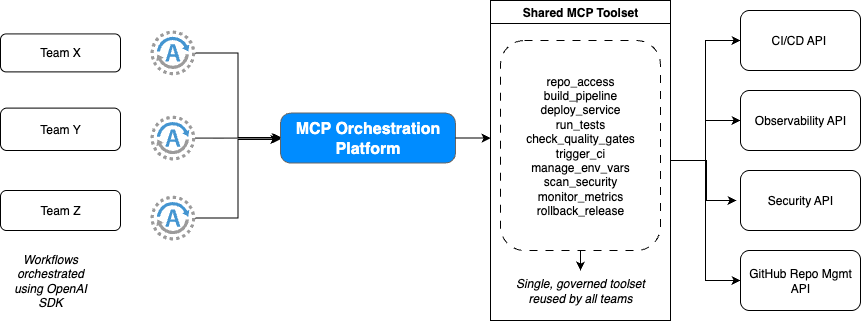MCP Agent Orchestration for SDLC Workflows

Enabled multiple engineering teams to converge on a shared set of standard tools and workflows using the Model Context Protocol (MCP) and OpenAI SDK. The orchestration platform allowed all teams to build, run, and automate SDLC workflows with agents, leveraging company infrastructure services.
Overview
The MCP agent orchestration platform enabled multiple engineering teams—including backend, frontend, architecture, devops, and platform—to coordinate and automate complex software delivery workflows. Each team previously used their own tools and processes, leading to duplicated effort, inconsistent standards, and friction when moving code through the SDLC. The company wanted all teams to converge on a common set of agent-driven tools and workflows, fully integrated with core infrastructure services.
Challenge
Siloed tools and scripts across teams made it difficult to standardize and automate the software delivery lifecycle. Manual handoffs, inconsistent automation, and lack of shared context slowed down delivery and increased operational risk. The organization needed a unified orchestration platform where multiple engineering teams could build, run, and automate SDLC workflows using agents and a standard set of tools.
Solution
We designed and delivered an MCP-based orchestration platform using the OpenAI SDK, standardizing agent interfaces and tool usage across multiple engineering teams. Workflows were created for each stage of the SDLC—from code review to deployment—and all agents used the same set of tools (linting, testing, build, deploy, etc.) that hooked into the company’s infrastructure. Teams could compose, extend, and automate workflows, ensuring consistency and accelerating delivery. The platform provided a shared context, auditability, and seamless integration with CI/CD, cloud, and monitoring services.
Why MCP vs Hard Workflows
Instead of each team writing brittle, one-off scripts, MCP exposes a single, governed set of SDLC tools. Teams use the same APIs and quality gates but can orchestrate them flexibly via agents and the OpenAI SDK. This keeps workflows adaptable, enforces governance, and speeds up delivery without duplicating effort.
Results
- Workflow Standardization: 100% of teams adopted the new platform
- Integration Time: Reduced by 70%
- Deployment Frequency: Increased by 40%
- Agent Response Time: 200ms (p95)
- System Uptime: 99.99%
Multiple engineering teams adopted the MCP agent orchestration platform, eliminating duplicated tooling and manual handoffs. SDLC workflows became fully automated and auditable, with agents using a shared set of tools integrated into company infrastructure. Integration time for new workflows dropped by 70%, and deployment frequency increased by 40%.
Ready to orchestrate AI agents across your SDLC?
Aurvia's Agentic AI Rapid Prototyping Studio helps you build MCP-based orchestration platforms:
- Standardized Workflows - Unified agent interfaces and tool usage across teams
- SDLC Automation - From code review to deployment with AI orchestration
- Governed & Auditable - Clear accountability and compliance for AI decisions
- Rapid Integration - 70% faster integration time with shared tooling
Strategic Technology Utilized
- Python
- OpenAI SDK
- LangChain
- Kubernetes
- Redis
- CI/CD
- Cloud Services